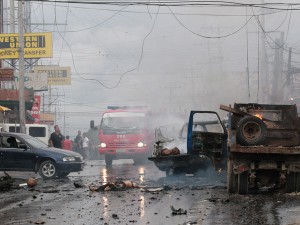
In this picture shows the scene where a car bomb exploded in the southern Philippine city of Cotabato, August 5, 2013. The blast killed five people and wounded dozens. INQUIRER FILE PHOTO
MANILA, Philippines—The Philippine National Police (PNP) on Wednesday appealed for calm amid the recent spate of bombings in Mindanao and bomb threats in government offices in Metro Manila.
“Amid the unfortunate events in Mindanao, the PNP is urging public to remain calm… and refrain from spreading speculations and wrong information which only bring confusion and fear,” PNP spokesman Senior Supt. Reuben Theodore Sindac told a news briefing at Camp Crame.
“We would like to assure the people that the national police are doing everything to ensure their safety. The PNP is on top of the situation,” Sindac said.
Sindac also asked the public to report to authorities any information that would lead to the arrest of the perpetrators of the separate bombings in Mindanao, which claimed the lives of 16 people and wounded over 80 others.
He said individuals may text and call PNP hotline numbers 117 and 0917-8475757.
The military also called on the public to be “alert and vigilant.”
In a statement, Armed Forces spokesman Lt. Col. Ramon Zagala said the military “is exerting all efforts to thwart possible attacks against civilians and establishments.”
“Our troops will remain vigilant and will continue to exert pressure on armed threats to prevent them from planning and executing terroristic activities,” he added.
On Monday, eight people were killed, including children and ranking police officials, when a car bomb exploded in Cotabato City. Two weeks ago, eight people died in a bomb explosion at a popular mall in Cagayan de Oro City.
In Maguindanao on Wednesday, seven Army troopers from the 1st Mechanized Infantry Battalion suffered minor injuries after a roadside bomb exploded near their military truck.
The Bangsamoro Islamic Freedom Fighters (BIFF) supposedly claimed responsibility for the attack on the military.
Hours before the Maguindanao bombing, a bomb exploded in Midsayap, North Cotabato. No one was hurt.
Sindac disclosed that police investigators had come up with a computer-generated sketch of two men reportedly seen outside the safe house of the supposed group that set off the car bomb in Cotabato City.
He, however, declined to provide other details.
Sindac said the possibility that Cotabato City administrator Cynthia Guiani-Sayadi was the target of the bomb attack remained the strongest motive in the incident.
Police have identified a certain Usman Hapids as the suspect in the Cagayan De Oro bombing. He has been charged with multiple-murder and multiple frustrated murder together with the other still unidentified suspects.
Police are conducting target hardening and intelligence operations in the aftermath of the bombings.
The Inquirer learned Wednesday that two months ago, “Black Flag” bomb technicians from Afghanistan trained a group of disgruntled members of the Moro Islamic Liberation Front (MILF) in making improvised explosive devices (IEDs) somewhere in Central Mindanao.
The “Black Flag” is the term the military uses for the al-Qaida terror group. The recent spate of bombings in Mindanao appears to be a test mission for its most recent trainees, a well-placed military source told the Inquirer.
The source reiterated what President Aquino said on Monday that the bombings could be the handiwork of peace saboteurs, who are against the peace talks between the government and the MILF.
But the Inquirer source noted that the bombings were quite sophisticated, which could also indicate that these could be more than just about local politics.
Interior Secretary Mar Roxas on Wednesday briefed senators during a hearing of the Senate committee on public order, chaired by neophyte Sen. Grace Poe, on the steps taken by the police to prevent more bomb attacks.
Roxas, however, declined to answer questions on the latest developments in the investigation of the bomb attacks, saying doing so in open session would be detrimental to the investigation and follow-up operations.
PNP Director-General Alan Purisima told the Senate committee that certain explosives were being sold openly in retail in a market in Jolo and that small purchases of the substances from the market can be put together to make a bomb.
Purisima said these explosives are being used for illegal fishing. “These can be packed bigger to have stronger explosives,” Purisima told Poe.